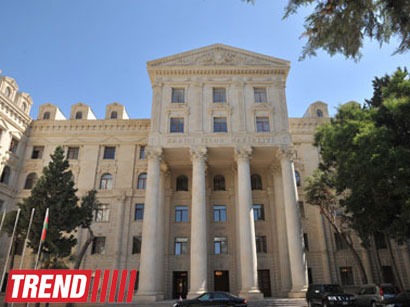Baku, Azerbaijan, May 12
By Elmira Tariverdiyeva - Trend:
Nagorno-Karabakh conflict should be solved at the root, not just create the appearance of a settlement as does Armenia, the Azerbaijani Foreign Ministry spokesman Elman Abdullayev told Trend, commenting on the recent statement by Armenian Foreign Minister Edward Nalbandian on the conflict.
Armenia should understand that the longer Yerevan delays settlement of the conflict, the more it loses, he said.
"The presidents of the OSCE Minsk Group co-chairs in almost all their statements clearly indicated that the status quo is unacceptable and must be changed. This thesis was once again repeated in the last statement of the OSCE Minsk Group," Abdullayev said.
Azerbaijan's occupied territories can not be named differently, as the occupation is evident to all, according to the diplomat.
They are called occupied not only by the MG co-chairs, but also the world community, which understands and accepts the fact that these territories are the part of the Azerbaijani Republic and for many years occupied by Armenia, the Foreign Ministry spokesman said.
As regards the issue of withdrawal of the snipers, human casualties, creation of a mechanism to investigate incidents as well as tensions on the front line as a whole, the whole responsibility falls on Yerevan since Armenia is an occupier.
"This is a historical responsibility, and it is already time for Armenia to realize that the country can not bear this burden forever with impunity and Yerevan has to answer for it. On the basis of tension in general is the fact of occupation and physical presence of Armenian Armed Forces on the territory of Azerbaijan," he said.
Touching upon the latest statement of the OSCE Minsk Group, Abdullayev said that the gradual settlement of the conflict is based on the six principles of the Madrid document referred to by the co-chairs. The first step and the basis of the Madrid Document is compulsory withdrawal of Armenian troops from the occupied territories of Azerbaijan, according to the diplomat.
"Yes, we have agreed on the provisions of the Madrid document as the basic principles for the settlement of the conflict, and now Armenia should demonstrate political will and begin to fulfill the main condition, starting with the withdrawal of troops, as at gunpoint it is not possible to create the conditions for trust between the parties to the conflict," he said.
There is hope that with the last statement of the OSCE, Armenia will extract the necessary signals, including the unacceptability of the status quo and that halting the negotiation process always through various tricks will not work, according to Abdullayev.
OSCE Minsk Group co-chairs issued a statement on the occasion of the 20th anniversary of the signing of the ceasefire agreement between Azerbaijan and Armenia.
In accordance with the statement, the settlement process includes the elements outlined by the presidents of the co-chairs in the statements from 2009 to 2013, considering the return of the territories surrounding Nagorno-Karabakh, interim status for Nagorno-Karabakh, etc.
The conflict between the two South Caucasus countries began in 1988 when Armenia made territorial claims against Azerbaijan. As a result of the ensuing war, in 1992 Armenian armed forces occupied 20 percent of Azerbaijan, including the Nagorno-Karabakh region and seven surrounding districts.
The two countries signed a ceasefire agreement in 1994. The co-chairs of the OSCE Minsk Group, Russia, France and the U.S. are currently holding peace negotiations.
Armenia has not yet implemented the U.N. Security Council's four resolutions on the liberation of the Nagorno-Karabakh and the surrounding regions.
Translated by S.I.
Edited by C.N.






